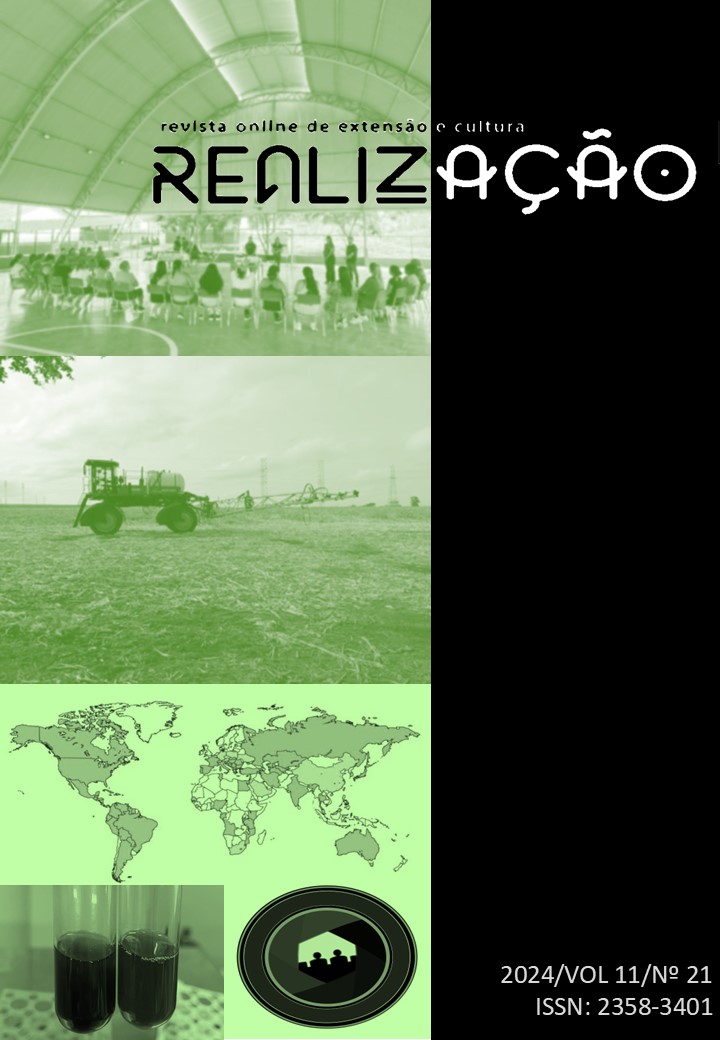UNIVERSITY EXTENSION PROJECT “WHERE DO THEY COME FROM?”: DISCOVERING THE ORIGIN OF FOOD OF ANIMAL ORIGIN
DOI:
https://doi.org/10.30612/realizacao.v11i21.18948Keywords:
Agricultural Sciences, Dissemination, Education, Santarém, Food technologyAbstract
Although the consumption of animal products is significant, many consumers, especially those living in urban centers, are unaware of the origin of these products and the processes they go through until they reach their tables. Started in 2016 in Santarém, PA, the “Where do they come from?” project aims to share knowledge about the origin of food and the associated production chain with the community in the region, especially in urban areas with no direct connection to agricultural production. From July 2023 to June 2024, the project was conducted by students from the Zootechnics, Agronomy, Biotechnology and Biology courses, with the support and guidance of UFOPA's teaching and technical staff. The outreach activities were aimed at three groups: students and teachers from basic education, students from public and private higher education institutions in the region, and elderly people taking part in physical activities at the Basic Health Units in Santarém, PA. By involving different age groups and educational levels, the project not only contributed to the students' academic training, but also provided the community with valuable information about the food production chain, demonstrating the success and effectiveness of the actions carried out through significant participation by the population.
Downloads
References
ALMEIDA, L. P. A extensão universitária no brasil. Les Universités Latino-Américaines Aujourd’hui: expressions locales, [S.L.], n. 7, p. 56-67, 31 dez. 2015. Universite deLimoges. http://dx.doi.org/10.25965/dire.692. Disponível em: https://www.unilim.fr/dire/692.Acesso em: 30 jun. 2024.
AQUINO, A. A. Tecnologia de produtos de origem animal. Editora e Distribuidora Educacional S.A., 2017. ISBN 978-85-84C82-859-3
SILVA, D. F. Projeto “De onde vem o mel?...” Descobertas e vivências sobre a produção de mel na fase III. Mostra Mão na Massa. 2011
SILVA, W. P. EXTENSÃO UNIVERSITÁRIA: um conceito em construção. 2020. Revista Extensão & Sociedade. Pg. 21 – 37. Disponível em:https://periodicos.ufrn.br/extensaoesociedade/article/view/22491/14110. Acesso em: 30 jun. 2024
SOUTO, L. Utilização do Instagram® como estratégia para disseminação de conhecimento acerca da ciência dos alimentos. Revista ELO- Diálogos de Extensão. Viçosa. MG, v. 11, 2022. DOI 10.21284/elo.v11i.14693. DOI: https://doi.org/10.21284/elo.v11i.14693
Downloads
Published
How to Cite
Issue
Section
License
Copyright (c) 2024 Maria Glenda da Silva Gonzaga, Paula Manuele dos Santos Viana, Eduardo Silva de Medeiros, Andrya Lopes Leão, Luís Davi Silva de Oliveira, Isabelle Leonora Meireles Cordeiro, Letícia Manuele dos Santos Sarmento, Fabrizia Sayuri Otani

This work is licensed under a Creative Commons Attribution-NonCommercial-ShareAlike 3.0 Unported License.
Autores que publicam nesta revista aceitam as normas de publicação, bem como, concordam com os seguintes termos:
(a) O Conselho Editorial se reserva ao direito de efetuar, nos originais, alterações da Língua portuguesa para se manter o padrão culto da língua, respeitando, porém, o estilo dos autores.
(b) Autores mantêm os direitos autorais e concedem à revista o direito de primeira publicação, com o trabalho simultaneamente licenciado sob a Creative Commons Atribuição-NãoComercial-CompartilhaIgual 4.0 Internacional que permite: Compartilhar — copiar e redistribuir o material em qualquer suporte ou formato e Adaptar — remixar, transformar, e criar a partir do material. A Creative Commons Atribuição-NãoComercial-CompartilhaIgual 4.0 Internacional considera os termos seguintes:
- Atribuição — Você deve dar o crédito apropriado, prover um link para a licença e indicar se mudanças foram feitas. Você deve fazê-lo em qualquer circunstância razoável, mas de nenhuma maneira que sugira que o licenciante apoia você ou o seu uso.
- NãoComercial — Você não pode usar o material para fins comerciais.
- CompartilhaIgual — Se você remixar, transformar, ou criar a partir do material, tem de distribuir as suas contribuições sob a mesma licença que o original.
- Sem restrições adicionais — Você não pode aplicar termos jurídicos ou medidas de caráter tecnológico que restrinjam legalmente outros de fazerem algo que a licença permita.


